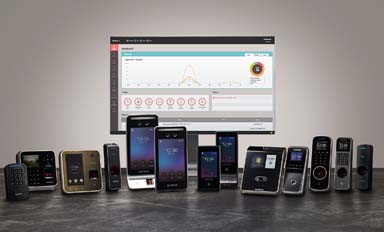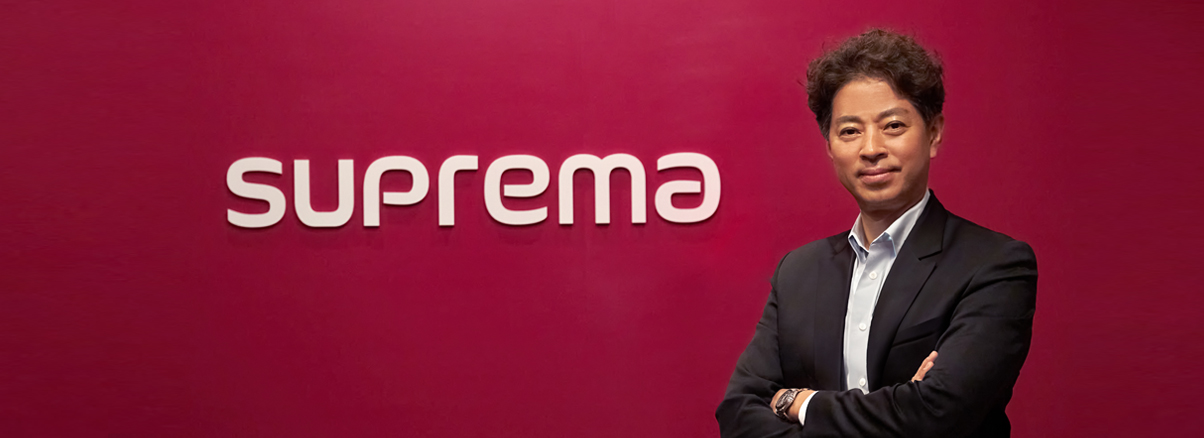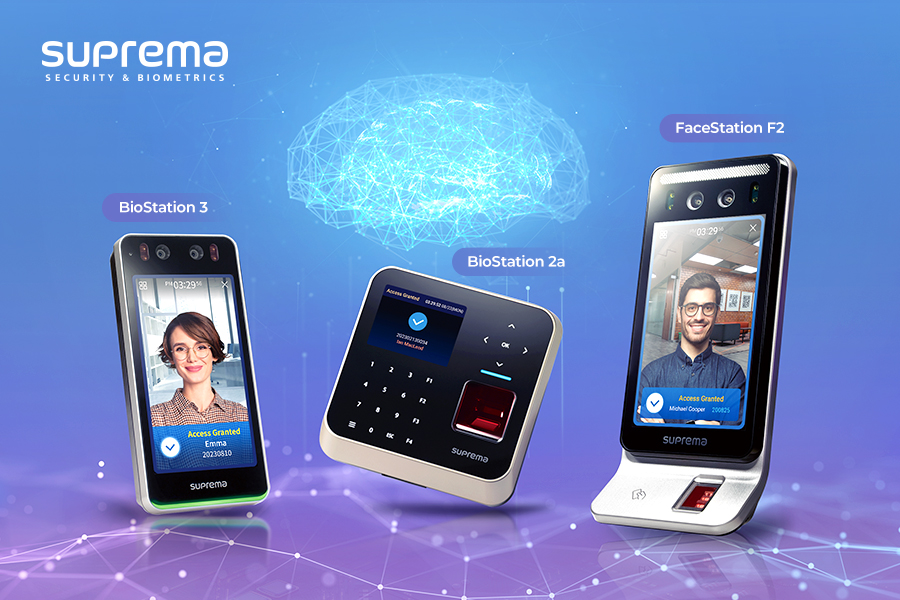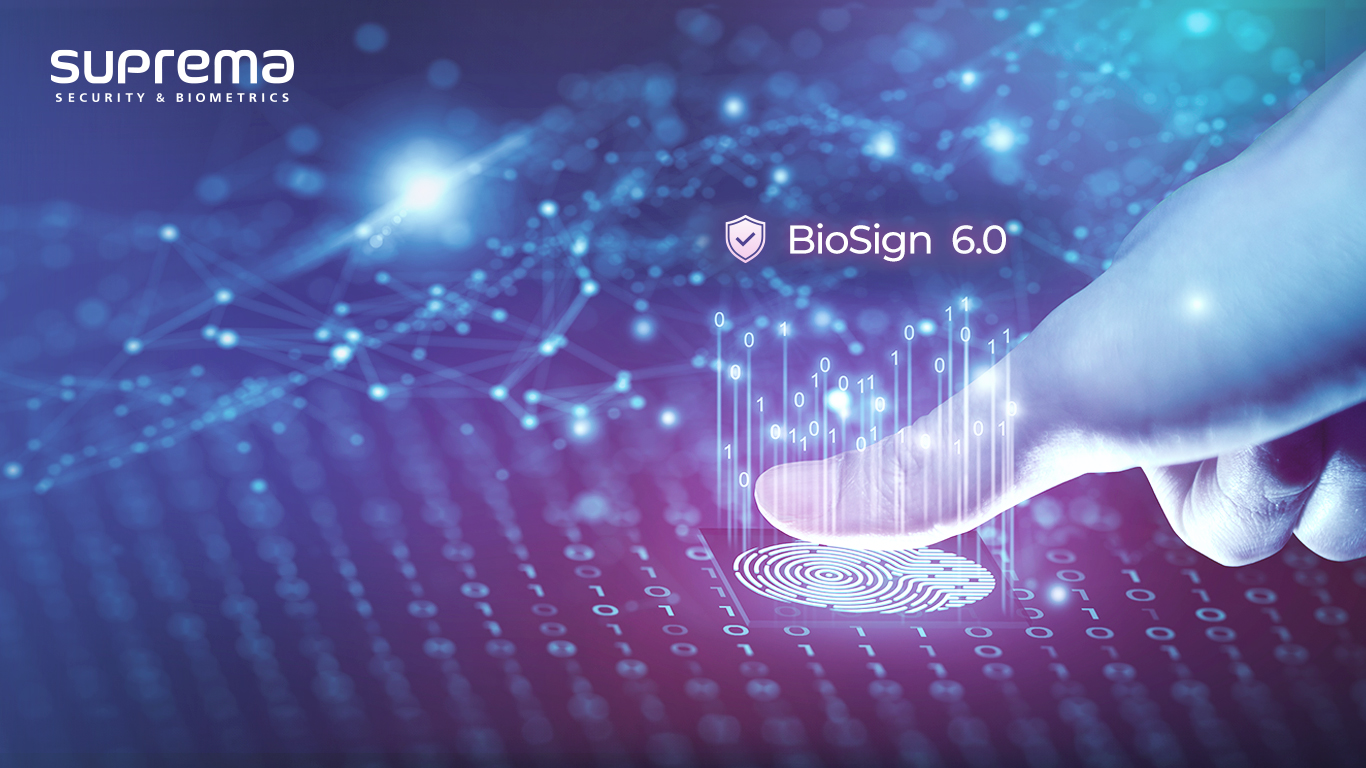- PRODUCTS
- PLATFORM
- BioStar 2 Access Control
- BioStar Air Access ControlNEW
- BioStar 2 Time and Attendance
- Suprema Mobile Access
- HARDWARE

- Biometric Readers
- RF/ Mobile Readers
- Intelligent Controller
- Peripherals
- OEM Biometric Modules
- Wireless Door Locks
-
Discontinued Products
- 4 Door Kit
- FaceLite
- BioStation A2
BioMini Plus 2
- BioStation 2
- OMNIS
X-Station 2(XS2-QAPB, XS2-QDPB)
- BioStation L2
- SOLUTIONS
- SUPPORT
- ABOUT
- device_hubHUB
- Blogs & Articles

△ JAMES LEE Ⅰ SUPREMA INC. FOUNDER AND CHAIRMAN
The high-tech Korean company has expanded its technologies by implementing deep-learning AI for biometrics within its integrated security solutions.
While Korean SMEs have often benefited from the success of Korean conglomerates, the increasingly saturated and competitive domestic landscape is forcing these companies to think globally to sustain their growth trajectories. What are the challenges and opportunities for Korean SMEs in global supply chains?
Our success formula differs significantly from typical Korean SMEs because we didn't benefit much from the ripple effects of Korean conglomerates' success. Initially, we did supply Korean conglomerates, but we penetrated international markets independently, establishing our own brand awareness. Unlike other Korean SMEs, we went overseas and faced business challenges head-on without the constraints faced in the domestic market. The domestic market was not mature and presented a challenging landscape, so we had to go global to stay afloat.
The last 20 years have been tough because, back in 2000, Korea’s recognition on the global stage was limited. Products or brands associated with Korea were not widely known. We overcame these challenges through our superior technological capabilities, especially in biometrics. It was crucial to demonstrate the success rate and performance of our biometrics to consumers. Our engineers, all holding PhDs, were also adept salespeople, providing profound technical support to our clients. Despite our small size, we offered unrivaled, fast, and accurate technical support. Initially, we didn't provide finished goods but focused on fingerprint modules. Now, Suprema has established the entire process, from hardware design to manufacturing and production, all managed in-house. Additionally, Suprema's dedicated research and development team is responsible for offering software and advanced AI algorithms, ensuring that all security products and solutions are fully developed using Suprema's own technology and resources. Our engineers worked tirelessly, offering robust technical support 24/7.
Regarding the macroeconomics of Korea, we are quite an outlier among Korean SMEs because we didn't follow their traditional success recipes. In addition, during the establishment of our company, we capitalized on the dot-com bubble era's innovative technology. In the early 2000s, Suprema pioneered the industry by using Google search ads globally, making it one of the first companies in the world to connect with customers digitally. This groundbreaking initiative led to significant success.
With the rise of frontier technologies such as AI computing, we see two types of companies competing in the market: legacy ones like yours, making efforts to integrate advanced IT technologies, and new startups coming with these technologies but facing challenges in implementing robust and quality products. What challenges do you face when competing with new startups, and how do you adapt to these new ICT technologies?
We've experienced several pivotal moments in our business. Currently, AI is the emerging technology that presents our biggest challenge. Early on, our success was driven by leveraging our technological prowess in internet and digital marketing. Now, startups with their advanced AI technologies have become our major competitors.
The COVID-19 pandemic accelerated the transition to the AI era, with a significant shift from contact-based to contactless solutions. This change necessitated moving from fingerprint recognition to facial recognition. Initially, we used classical mathematics-based AI technology, but it wasn't our flagship product. To compete with Chinese companies that had developed AI-driven facial recognition technology, we had to quickly adapt. Initially, for our AI-based facial authentication, Suprema utilized fingerprint recognition algorithm technology developed by our experienced experts. By applying this traditional AI training method, we were able to quickly enter into facial recognition market. However, as Chinese companies, supported by lenient personal information policies and government initiatives, rapidly advanced in facial recognition technology, the market competition intensified. This challenge provided Suprema with an opportunity to further focus on advancing AI technology and product performance enhancement.
Through our dedicated R&D efforts, we improved the performance of our deep learning-based facial authentication technology and responded swiftly to competitors' challenges by launching edge devices embedded with NPUs (Neural Processing Units) to optimize AI performance directly on the device. As a result, we successfully positioned ourselves in the market as a company that provides premium on-device AI products with the best facial authentication performance in the AI-driven market. Although we were late to the scene, we invested heavily in AI-incorporated facial authentication technology and gained success.

Over the past one to two years, there has been fierce competition in this market. Due to our long track record and expertise for over 20 years, we have now realized our competitiveness. I believe the competition is nearing its end. Our success can be summarized in a few keywords: rapid response to emerging technologies, swift resource investment into AI-based facial authentication and fingerprint recognition technology leveraging our deep-learning capabilities. This strategy allowed us to overcome the crisis and established itself as a leader in biometric recognition technology. Leveraging extensive experience and a vast dataset, Suprema has become an unparalleled authority in this technology by introducing the world's first deep learning-based facial authentication and fingerprint recognition access control solutions BioStation 3 and BioStation 2a.
When discussing the biometrics and face recognition markets, significant security and privacy concerns have led the public to question the efficacy and motives of this industry. With the rise of AI accelerating the availability of these features, these concerns are even more prominent. How do you address these concerns? What steps do you take to ensure privacy with your products?
Privacy concerns are critical and will only grow in importance. Addressing them is both straightforward and challenging. The straightforward answer is to fully comply with GDPR and the strict regulations of each nation. We have invested significantly in consulting and advisory services to understand and comply with these regulations and national security acts.
The application of security measures such as encryption for data protection is, of course, essential. In addition to this, it is crucial to ensure that the processes for collecting and handling personal data comply with GDPR requirements, which we have implemented. However, navigating and adhering to each regulation and national policy is very complex. To address this, we not only aim to meet current regulations but also focus on data protection to prevent leakage or breaches during the development process. This means that while collecting data for machine learning, we are proactively and meticulously working on data protection.
Korea and Europe have similar regulatory levels. By meeting these highest standards, we can tailor our solutions to comply with national regulations around the world. Ensuring compliance involves significant effort and investment, but it is essential for maintaining the highest levels of security and privacy in our products.
Suprema prioritizes the protection of personal data and strictly adheres to both the NIS 2 Directive (Network and Information Systems Directive 2) and the General Data Protection Regulation (GDPR) throughout all stages of product development and operation. Suprema’s edge devices securely store and manage user and biometric authentication data, utilizing advanced security technologies to encrypt all sensitive information. These devices are equipped with Secure Element (SE) chips, which store encrypted personal data and cryptographic keys in an isolated environment, preventing decryption in the event of a data breach.
Suprema also applies robust data protection and cybersecurity measures in its software development. The company has implemented ‘Secure Coding’ practices to prevent security vulnerabilities and uses ‘Secure Boot’ to ensure safe system startup by restricting the installation of unauthorized software. Additionally, sensitive data is protected using AES 256 and SHA256 encryption methods, and the full lifecycle of encryption keys is securely managed through a Key Management Solution (KMS).
Suprema conducts regular static analysis and penetration testing and collaborates with its information security team from the development stages to identify and mitigate security issues. The company regularly renews its ISO/IEC 27001 and ISO/IEC 27701 certifications and has recently added CSA Star Level 2 certification to enhance cloud security, thereby boosting trust in the protection of biometric and personal information in cloud environments.
Founded in 2000, Suprema has grown to be a global leader in biometrics and security solutions. You are positioned within the top 50 security companies in Europe, Middle East, and Africa, you are also one of the first companies in biometrics technologies in the world. Could you walk us through the key milestones in Suprema’s journey since its establishment?
Reflecting on our journey, our business principles and philosophy in creating innovative products were quite similar to those of Steve Jobs when he first introduced the iPhone. Each technology integrated into the iPhone wasn't proprietary to Apple but was combined into a single, innovative product. Our access control and security solutions have similarly caused seismic shifts in the existing market.
In the early days, Korean conglomerates and manufacturers often prioritized price competitiveness over product quality. However, we were not content to follow this trend. We aimed to create a paradigm shift in the market by focusing on superior quality and innovation. In security industry, factors like reliability and durability are non-negotiable, we also sought to elevate design aesthetics and functionality. We embedded features such as a sophisticated look and feel, Wi-Fi functionality, color LCDs, and enhanced CPU performance into our biometric products to create a competitive edge.
This forward-thinking business spirit has paid off, allowing us to spearhead the industry as a first mover. We have consistently maintained our reputation as a top-tier, best-in-class company, continually leading the market with our innovative solutions.
By introducing innovative technologies, creativity, and unique features, you have managed to penetrate various industries, such as medical, industrial, residential, and commercial buildings, in different regions. Which industries and regions represent the greatest opportunities today?
Our business patterns are diverse across different regions. In some areas, we supply only hardware; in others, we provide a complete system, including both hardware and software. For certain projects, we offer standalone integrations, while in others, we partner with conglomerates for large-scale systems integration (SI) projects. We don't see growth potential confined to a specific region. Just as Apple and Samsung sell their phones globally, we have a ubiquitous presence, tailoring our strategies to each nation's unique characteristics.
Rather than formulating strategies based on regional growth potential, we focus on specific industry areas where our products perform well. For instance, there is a growing demand for data centers, driven by the increasing need for AI. In the Middle East, there are numerous construction projects, making it a significant market for us. Recently, Japan's economy has been sluggish, but we are now seeing signs of recovery, and we are also focusing on that market.
For conglomerates, their requirements are typically very demanding and complex. From our headquarters, we provide them with customizations, or our local partners will develop tailored solutions to meet their specific needs. For SMEs, they generally adapt to the functionalities we offer out of the box, allowing them to benefit from our advanced features without the need for extensive customization.
We have a network of local partners across the world because we cannot provide a one-size-fits-all solution to our customers; we need to customize our approach based on the client's needs. This is where our local partners come in.
Among your flagship innovative solutions, the “BioStation 3” and “BioStation 2a” are edge AI devices using a powerful NPU directly integrated within your products. This is an interesting choice, especially since some of your competitors favor either edge computing or fully cloud-based AI platforms. Could you explain the advantages of your solutions?
In this industry, edge-based AI device technology is often more effective than fully cloud-based solutions. This is because security demands often require on-premise systems with limited external access. Additionally, cloud-based access control can experience delays in facial data transmission. Our edge-based AI devices address these challenges, providing faster, more reliable access control. Suprema also offers cloud platform services, but we enhance reliability by integrating edge computing devices alongside the cloud platform.
This situation led you to develop Template on Mobile (ToM). How is this more advanced than your competitors' solutions, and how does it improve face recognition systems?

'Template on Mobile (ToM)', the world's most innovative authentication method, can be a groundbreaking technology, especially in regions with strict GDPR enforcement. ToM resolves privacy concerns by providing a solution for users who are hesitant to store their facial or biometric data in security systems. Instead of storing this sensitive data within the system, ToM allows users to keep it securely on their smartphones. Authentication is then performed via Suprema's devices, ensuring that no biometric information is stored or retained within the system. This approach satisfies both users and administrators by safeguarding privacy while maintaining security.
Adding to this, Suprema is not using the term 'Facial Recognition'. 'Facial Recognition' identifies faces through detection and surveillance. However, 'Facial Authentication,' our chosen term, emphasizes user consent. Our security ensures authentication only with explicit user agreement, setting us apart from passive recognition methods. This aligns with GDPR, underlining data protection as our core value.
Furthermore, you have also developed AI algorithms such as BioSign and Q-Face Engine, offering the possibility for companies worldwide to integrate these advanced AI algorithms. How do you believe selling these AI algorithms, independently developed by Suprema, can benefit your company and the industry?

The Q-Face Engine is an AI-based facial authentication algorithm developed in-house by Suprema, specifically optimized for on-device use in embedded systems and applications that require secure, contactless biometric recognition. This algorithm is integrated into Suprema AI's facial authentication module, Q-Face Pro, and Suprema's flagship product, BioStation 3. Suprema AI, a subsidiary of the Suprema Group, specializes in edge AI-based biometric recognition and image analysis solutions. Suprema’s AI facial authentication algorithms are widely applied in various areas, including access control systems, self-service kiosks at airports, and entry kiosks. While Suprema does not manufacture kiosks themselves, our technology can be seamlessly integrated into them, allowing for broad applicability across different environments. Recently, Suprema has expanded into video surveillance by integrating its algorithms into third-party IP cameras, which are now being commercialized and sold.
BioSign, Suprema’s AI-based fingerprint recognition algorithm, plays a major role in our business. The latest version, BioSign 6.0, is an under-display ultrasonic fingerprint recognition algorithm. Since 2019, starting with the Samsung Galaxy S10, Suprema’s fingerprint recognition algorithms have been incorporated into numerous Galaxy S series devices, earning recognition for their world-class technological capabilities. The BioSign 6.0 version, featured in the Samsung Galaxy S24, has been particularly well-received in the market, noted for its significantly enhanced fingerprint recognition speed and security.
I believe that AI algorithms like these have substantial growth potential across multiple fields. Their versatility and adaptability make them key solutions for future success. AI-based facial authentication and fingerprint recognition algorithms offer two significant advantages. First, they strengthen our R&D capabilities. By continuously improving these AI algorithms and integrating them into our hardware, we enhance performance, advance our technology, and provide customers with the latest innovations. Second, these algorithms enable us to popularize biometric technology beyond the physical security industry, allowing more people to experience Suprema’s biometric technology in various fields. This widespread adoption opens up opportunities for expanding biometric technology into new areas in the future, ensuring sustained business growth and identifying new opportunities.
One of the reasons Nvidia's GPUs were so successful can be largely attributed to their CUDA platform, which brought ease of use for developers. What measures have you implemented to help engineers from other companies integrate your products into their technologies?
.png)
Our BioStar 2 platform can seamlessly integrate into various systems, supported by our software development kit (SDK) and open API connection, similar to Nvidia's CUDA platform in GPU domains. BioStar 2’s scalable and flexible architecture is designed to meet the diverse security requirements of businesses of all types and sizes from small and medium-sized businesses to large-scale organizations. Additionally, BioStar 2 offers advanced features that help organizations achieve their security, safety and compliance objectives, including historical and forensic reporting, alarm and fire zone management, photo badging and powerful real-time monitoring. It can also be expanded further with video surveillance, visitor management and time & attendance systems.
Supporting development in a cloud environment is also a crucial aspect where many of our competitors lack competitiveness. Suprema excels in bridging the gap between on-premises and cloud-based systems by CLUe, an open cloud integration platform. CLUe enables our edge devices to integrate seamlessly into third-party systems.
In 2022 alone, Suprema achieved an impressive annual turnover of over 94 billion KRW, underscoring their robust financial performance amidst competitive landscapes. How do you see your future in the next five years? Where do you expect your revenue stream to come from?
The pandemic, which broke out in early 2020, caused our revenue to nosedive compared to 2019 when our performance was better. Due to the nature of this industry, the growth trajectory is moderate because of high entry barriers. However, once you enter the market, the business can be sustainable. Although our growth may be slow, excluding the anomaly of 2020, our revenue has been steadily increasing. Our primary objective is not just on quantitative revenue but on the steady growth of our company.
Our journey began with the module business, followed by expansion into hardware, software and biometrics, eventually integrating these technologies into smartphones. As AI and cloud technologies continue to evolve, we are focusing on merging physical access control with advanced surveillance solutions. AI’s integration into both biometrics and security surveillance is expected to meet growing market demand, which we believe will be a key driver of our growth in coming years.
As an ambitious company, what strategy are you implementing to capture the world’s number one market share?
Penetrating the US market is one of our most significant challenges. The potential is substantial due to the market's size, the reshoring policies, and the robust economy. However, the presence of major competitors in the US makes this a formidable task. Our strategy is not only to supply our terminals but also to expand into becoming a solution provider, positioning us in direct competition with large US firms. The business landscape in the US is quite different from EMEA; brand awareness and credibility are crucial. Without established legacy brands or a robust channel network in the US, we cannot simply replicate our EMEA strategy in the US.
In Asia, market dynamics also differ from EMEA as well. While EMEA benefits from a construction boom and a well-established premium market, Southeast Asia lacks a comparable premium segment, making it challenging to apply the same approach. The competition in Southeast Asia is especially intense, particularly with Chinese competitors.
In Western Europe, privacy concerns, especially regarding GDPR, pose challenges to the widespread adoption of our biometrics solutions. However, if we fully comply with GDPR, we can turn this challenge into an opportunity, leveraging our adherence to data protection regulations as a competitive advantage.
As you mentioned, having strong partners is crucial for penetrating different markets. Could you define the types of partners and collaborators that are key to penetrating the US or Southeast Asia and to further growing market share in Europe?
In our major regions, we operate with branch offices staffed entirely by local employees. For instance, our US branch is managed by our US-based team. In regions with high market potential but an insufficient sales network, we take an aggressive approach by directly hiring local talent to build a robust workforce. This local expertise is essential for navigating and expanding in these markets effectively.
Your company is celebrating its 24th anniversary this year. Let's imagine we come back six years from now for your 30th anniversary and conduct this interview again. First, what would you like to have accomplished over the next six years?
I hope to have achieved our goal of establishing the company as a leading security solution provider that seamlessly integrates AI, surveillance, and cloud technologies.
I would like our company to be recognized as a unique gem from Korea, distinguished by qualities that set us apart from other Korean firms. Our aim is to be globally acknowledged for our distinctive approach and innovative solutions in the security industry.
Source: The Worldfolio











